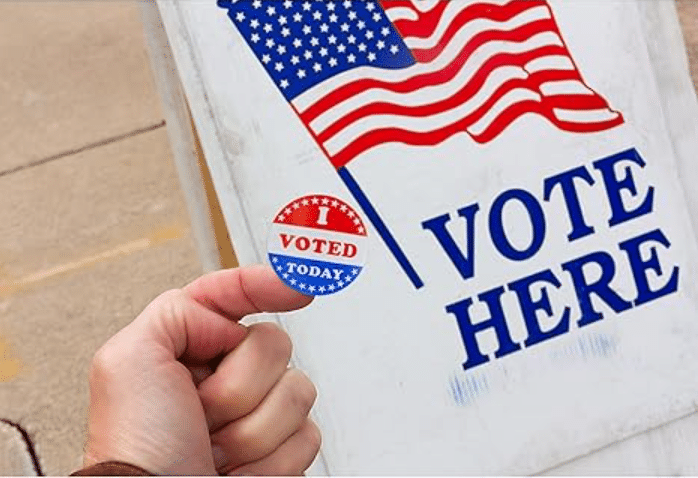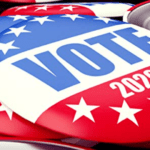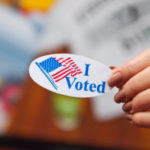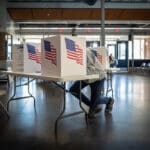
If the world’s richest man can hand out cash to voters without the feds taking action, chances are you’re not going to get in trouble for displaying your “I Voted” sticker at a local restaurant to claim a free cookie or a side of fries.
Nevertheless, it’s worth repeating a quadrennial reminder that many well-meaning Election Day giveaways are patently illegal – and not only can the giver be prosecuted under federal law, but you as the recipient can, too.
So hope that free cookie is worth doing hard time!
Two federal statues apply any time a federal candidate – such as president, or members of Congress – are on the ballot. One prohibits “payment either for registration to vote or for voting,” and the other threatens fines and prison time for anyone who “makes or offers to make an expenditure to any person, either to vote or withhold his vote, or to vote for or against any candidate” as well as anyone who “accepts or receives any such expenditure.” The Department of Justice’s Election Crimes Manual elaborates that a reward “may be anything having monetary value.”
It sounds like a straightforward prohibition against vote-buying – “I’ll give you cash if you vote for me.” But election law experts say it’s more far-reaching than that.
Giving away a freebie to anyone who wears an “I Voted” sticker is meant to be a fun way to show off your civic pride, and for businesses to celebrate a red-letter day on the calendar. But the law is the law, and the law says you can’t offer or accept “anything having monetary value” in exchange “for voting,” regardless of your chosen candidate. Offering something for free only to those who can show with their sticker that they voted in a federal election – and denying that freebie to anyone who can’t – is therefore illegal.
Election law expert Rick Hasen of the UCLA School of Law brought attention to this little-known fact several election cycles ago, when Election Day freebies started to proliferate. Back in 2008, when nationwide chains Starbucks and Ben & Jerry’s announced they would give free items to those who showed their “I Voted” sticker, Hasen suggested they might want to rethink their plans. And they did, changing their promotions so anyone could claim the offer. “Originally, we planned to give free scoops away just to those who voted. We found out afterwards that certain laws may not allow it,” a Ben & Jerry’s spokesperson said at the time.
As recently as 2016, Krispy Kreme announced that “any guest wearing a sticker indicating he or she voted will receive one free doughnut of choice.” No sticker? No doughnut. “This delicious choice is only available to those guests wearing a voting sticker on Election Day,” the announcement went on. “It has been a long election season, and we think a free treat is the perfect way to reward voters,” a spokesperson said.
“Reward voters”? Yikes. Krispy Kreme eventually backtracked and modified its offer so anyone could claim a free doughnut on Election Day – no sticker required.
So why would the federal government be such a killjoy, threatening to fine and imprison Krispy Kreme employees and a store full of doughnut fans, all for an innocent giveaway? In a lengthy 2000 article for the California Law Review, Hasen discussed the example of a candidate in California whose party “offered $5 coupons for free chicken dinners” only in specific neighborhoods “where voters likely to support (him) lived.” The coupon recipients weren’t told who to vote for, but the implication was clear.
In that same vein, what if a local business in a particularly conservative or liberal area offered freebies to customers who showed their “I Voted” stickers, encouraging voters who weren’t inclined to vote to do so in order to get a sticker and their freebie, and the election outcome was affected as a result? What if a local business owner vocal about their own political leanings offered a freebie to voters, thereby boosting turnout among customers who shared their political beliefs?
It’s not quite the same as handing out wads of cash for voting for a particular candidate. But in a close race, it could impact an election just the same – which is why it’s illegal.
Krispy Kreme appears to have learned its lesson and is again this year offering a free doughnut on Election Day to all guests, regardless of whether they have an “I Voted” sticker. Others, however, haven’t gotten the message – the restaurant chain Johnny Rockets is offering “a free shake with any purchase with proof of voting (show us your sticker).”
(Update: a Johnny Rockets representative did not respond to a request for comment about its giveaway and its apparent illegality, though it did subsequently change the phrasing on its social media posts to “get a free shake with any purchase at participating Johnny Rockets locations when you mention ‘free shake’ in-store.” So, you’re welcome.)
This election cycle, Elon Musk has done more than anyone to bring attention to the issue. After awarding daily $1 million cash prizes to registered voters in swing states, the Department of Justice reportedly warned Musk’s political action committee that the giveaway might be illegal. While Philadelphia’s District Attorney has launched a separate, unrelated legal challenge to the giveaway, arguing it constitutes an “illegal lottery scheme,” federal prosecutors have taken no enforcement action.
There is, of course, a big difference between a million bucks and a free Johnny Rockets shake. But offering – or accepting – either of them could land you in the slammer for up to five years, in addition to a $10,000 fine. So be careful what well-meaning giveaways you accept tomorrow. Unless you want to risk your freedom for a freebie, your “I Voted” sticker, and the knowledge that you did your civic duty participating in our democracy, may be the only reward you need.
Image source: Amazon










